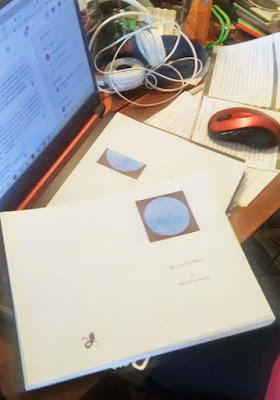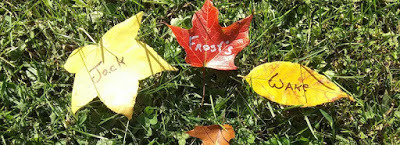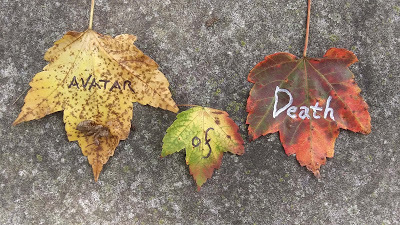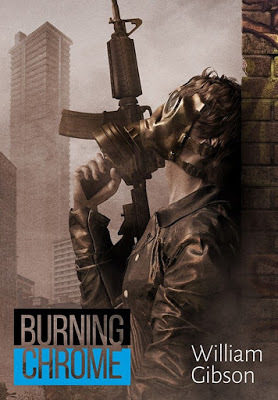Michael Swanwick's Blog, page 58
October 5, 2020
Blue As The Moon -- Halloween Only!
.

It is Marianne's whim, once in a blue moon, to create a Dragonstairs Press chapbook in an edition of 69 and offer it for sale only on the day of the blue moon. At midnight, the manuscript, mock-ups, and all unsold chapbooks are then ceremonially burned.
This year, Halloween falls on a blue moon. So I wrote some flash fictions appropriate to the day and season, which Marianne made into Blue as the Moon. The picture above shows the chapbook in the making.
It will not be available for pre-order. Nor will there be any copies available the day after. All will be sold or burned.
A video will be posted of the immolation on November 1st, All Saints Day.
Meanwhile, you can go to the Dragonstairs website here to marvel at how almost everything Marianne has ever published sold out long ago.
And speaking of the season . . .
Jack Frost's Wake (part IV)





Text: In his wake, plants die, insects die, birds die, mammals die.
*
October 4, 2020
Jack Frost's Wake (Part IV)
October 3, 2020
Jack Frost's Wake (Part III)
October 2, 2020
My Mythaxis Interview

I was interviewed recently by Tais Teng for Mythaxis, a review platform dedicated to art and technology.
Tais Teng is a Dutch SF writer, illustrator, and sculptor. In his own language he has written everything from radio plays to hefty fantasy trilogies.In English, he's sold two 52 stories and two children's books. His YA novel, Phaedra: Alasator 824, written in the universe of Jack Vance, was published by Spatterlight Press. He asked a lot of very good questions, some of them difficult to answer.
And I'm me.
So now you know whether or not you want to read the interview. You can read the interview here. Or, you know, just go to mythaxis.com and wander around. Sometimes the most productive thing you can do is just start reading things at random, without worrying where you'll wind up.
And Jack Frost's Wake continues with . . .



And the plaintext:
All the world is his canvas.
(to be continued tomorrow)
*
October 1, 2020
Jack Frost's Wake
.

It's that time of year again! Every autumn, as is my remit, I go out into the forests, parks, and cemeteries to write stories on fallen leaves. This year's tale is Jack Frost's Wake.
Enjoy.
Jack Frost's Wake






And in plain text . . .
Jack dances merrily through the trees, turning green leaves brown, red, yellow, orange.
(to be continued)
And in the coming weeks . . .
I'll be serializing this story, several leaves a day, now through Halloween. When I have other news, that will go at the top of the blog post. But there will always be more of the story to come. Until it climaxes on the day that is known by all my neighbors as "Michael's Holiday."
*
September 23, 2020
Triceratops Summer in Galaxy's Edge
.

I'm in print again! This time, it's "Triceratops Summer," one of my best stories ever. It's in the September issue of Galaxy's Edge, which was created by good ol' Mike Resnick.
Mike and I were on different parts of the SF spectrum--he a little more to the adventure end and me just a frazz more literary--though we both crossed the line into the other's home territory from time to back. Back in the day, SFWA had a publication called the Nebula Awards Report, which was simply a list of all the works nominated so far by members for the Nebula. arranged by category and then within each category by number of nominations received, with the names of people nominating each work. I used to read that thing like race track gamblers read tip sheets. Why doesn't that great story by Joanna Russ have more nominations? How could a mediocre story like that other thing be doing so well?
I quickly learned that there were a handful of people whose taste was very much like mine. So if three or four of them liked a story, it was something I had to read. There was another small group of writers whose taste was very much like Mike Resnick's. If three or four of them liked a story, I knew that at the very least I would enjoy reading it.
But if a couple of writers from my group and Mike Resnick liked something, I'd drop everything to get a copy of the publication it was in. Because I knew the story was something special.
This always worked. Because Mike Resnick loved science fiction, read everything, and knew a great story when he saw it.
So, really, it didn't come a surprise when he created Galaxy's Edge. He had all the right stuff to be an editor.
But if you take a look at his bibliography and see how much writing he did at the same time, you have to ask yourself: Wherever did he find the energy?
*
September 18, 2020
Burning Chrome and How I Almost Made William Gibson Look Bad
.
Look what just came in the mail! The new, beautifully-made Subterranean Press edition of William Gibson's short fiction collection, Burning Chrome.
I am awash in nostalgia.
Back when Bill and I co-wrote "Dogfight," which is the reason I received a copy of this book, we were both scruffy young nobodies. A casual meeting at a convention, a few chance words, and we were collaborating on a story. Gibson had a hot rep back then--but only if you were among the few, the new, and the hooked-in. Bill agreed to the collaboration because he's a genial guy. I went into the project because I wanted to see what kind of chops he had.
Pretty damn good, as it turned out.
We used the Hot Typewriter method for the story. Not the Hot Typewriter method of the Fifties, which involved a cheap hotel room, a rented typewriter, a bottle of hootch, and (sometimes) a hooker, but the Eighties version. Which was: One writer had control of the story for a month, during which he could write as much or as little as he wished. He do anything he wanted with it. Change the plot, change the characters, put things in and take things out. There were a couple of small details that Gibson took out that on the next pass I put back only to have him take them out, back and forth several times until at last Bill won. When you're working with somebody good, this can be a very exciting process.
On one of those passes, I came to a section that could only be written by Gibson. Luckily, from my collaborations with Gardner Dozois, I knew what to do. With Gardner, I had only to write a bad imitation of his style and its wrongness would so annoy him that he'd tear it all up and, with enormous labor, write it the proper way. So I wrote a bad William Gibson pastiche and sent it back to him, confident he would redo it from top to bottom.
One month later, I got the story back, expanded, with not one word changed in the pastiche section. In the accompanying letter, Bill was effusive with praise for that section.
Oh crap. I knew that if I let that section go through unchanged, the deficiencies that Bill was blind to would be as obvious to the critics as they were to me. Only, because it was written in Bill's voice (almost), blame for this would fall not on me but on him. And people would conclude that, whatever Bill had once had, he'd lost it.
So I spent much of that month laboring mightily to bring that section up to his standards. I succeeded, I believe, but oh man that was not fun.
End of anecdote. No, I am not going to tell you what section it was. You can read the story and make your own guesses. But I'll never tell you if you were right.
*
September 15, 2020
Morbidity, Mortality, and Gardner Dozois
.

The current scandal about the White House demanding the right to alter the Morbidity and Mortality Weekly Report has put me in a nostalgic mood about, of all people, Gardner Dozois.
To understand this, you first have to know that M&MWR back in the day was simply a list of the number all deaths in the US in the previous week, arranged by cause. So many people died of cancer, so many of head trauma, so many of hantavirus, and so on. They also had a single short, one-page essay on some related interesting matter, such as things surgeons had found in people's rectums. You could get a subscription to it free if you wanted, because almost all the people who knew of its existence had professional reasons to receive it.
You also have to know that Gardner was not an optimist. This led him to be willing to entertain borderline conspiracy theories. These could be reasonable ("There's a new disease...) or not ("AIDS can be spread through drinking water" which, the virus being an anaerobe, is absolutely untrue). I could almost never convince him he was wrong. He would listen to Marianne, because he respected her expertise, but her explanations never seemed to take hold in him permanently.
So one day, as a joke, I submitted Gardner's name and address to M&MWR.
Gardner loved it.
Once a week, the pamphlet-sized publication came in the mail. He scanned it, and knew exactly what was killing everybody and knew that there were no surprises lurking out there to ambush him. For years, until the print version was replaced by a virtual one, he was a happy man.
*
September 14, 2020
Me! Me! Virtual Me!
.
One unanticipated result of the Covid-19 self-isolation has been the explosion of virtual events, readings, panels, and conventions. All of which I am, as a citizen science fiction writer, expected to share my time with.
Two good examples of this phenomenon are embedded here.
Directly above is my "appearance" at the New York Review of Science Fiction Reading Series. The highlight of which is my reading of the opening of City Under the Stars, which is Gardner Dozois's last novel, co-written with yours truly.It is a dark, dark opening in which you get to see a man's life and soul destroyed right before your eyes.
So why might you want to hear it, and then read the book? Because after hearing it, you'll find it hard to believe that immediately after the section read, Hanson's life gets worse. And that after that, it gets even more worse. Yet it does.
This is a pattern that continues up to almost the end of the book when... unexpectedly, unbelievably... it has a happy ending. A hard-earned and well-deserved happy ending that the book was headed for all along.
And meanwhile . . .
Ongoing at this very moment is a totally mad enterprise called Con Tinual, known as "The Convention That Never Ends." Which, I have to say, is something that I've had nightmares about on the last night of more than one convention. But these cheerful, positive folk seem to have no problem with that aspect of it.
I participated in a discussion, one of a series called Hot Off the Press, in which participants talked about their recent books. The other (and very articulate) participants were Tom Doyle, Kyoko M, and Gail Z. Martin. The panel was ably MC'd by Jason Tongier.
The book I discussed was, of course, City Under the Stars.
Enjoy.
September 7, 2020
City Under the Stars at the NYRSF Reading Series

Tomorrow night, I'll be doing a virtual reading from City Under the Stars, which is Gardner Dozois' last novel, co-written by Yours Truly.
The event starts at 7:00 p.m., New York City time and ends at 8:30. There will be a reading, the usual badinage, some questions and answers (probably) and even some sentimental rambling about what a swell guy Gardner was (almost certainly).
Michael Swanwick/(channeling) Gardner Dozois
Tuesday, September 9, 2020
7:00 p.m.
Here's what hosts Jim Freund and Barbara Krasnoff have to say about the event:
This reading marks the beginning of our 30th Season! Sadly, we cannot all join together for a fete, but over the course of time, we'll figure something out. We wish to experiment with simulcasting the reading on our traditional home here on Facebook.
On Tor.com, Michael Swanwick wrote: "Almost a quarter century ago, Gardner Dozois and I published “The City of God,” now the first half of this novel. It ended with a slam, seemingly precluding any sequels. But over the decades Gardner and I talked over what might come next. We planned to write two more novellas, “The City of Angels” and “The City of Men,” which would tell one long, complete story. One with a happy ending.
Don’t laugh.
Yes, Gardner could be a bleak writer. Yes, the novella was dark even for him. But he had an uplifting idea for how the book would end. We discussed it often. We were midway through the second novella and aiming at that happy ending when, without warning, Gardner died.
I knew I would never write that third novella without his input, his genius. Nevertheless I wanted the world to see this genuinely happy ending. So I changed the direction of the work in progress, combined both novellas, divided them into chapters, and made of them a novel I think Gardner would have been pleased with.
The ending is exactly what Gardner envisioned all those decades ago. A happy one. For everyone.
When I wrote the last words of it, I cried." --
Michael Swanwick has received the Nebula, Theodore Sturgeon, World Fantasy and Hugo Awards, and has the pleasant distinction of having been nominated for and lost more of these same awards than any other writer. He has written ten novels, over a hundred and fifty short stories, and countless works of flash fiction. His latest novel The Iron Dragon’s Mother, was recently published by Tor Books.
He lives in Philadelphia with his wife, Marianne Porter.
Gardner Dozois was one of the most important editors in the history of science-fiction. His editorial work earned more than 40 Hugo Awards, 40 Nebula Awards, and 30 Locus Awards, and he was awarded the Hugo for Best Professional Editor fifteen times between 1988 and his retirement from Asimov’s in 2004, having edited the magazine for 20 years! He also served as the editor of The Year’s Best Science Fiction anthologies and co-editor of the Warrior anthologies, Songs of the Dying Earth, and many others. As a writer, Dozois twice won the Nebula Award for best short story. He was inducted into the Science Fiction Hall of Fame in 2011 and received the Skylark Award for Lifetime Achievement. *
Michael Swanwick's Blog
- Michael Swanwick's profile
- 546 followers










